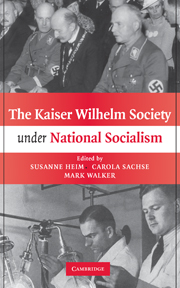Book contents
- Frontmatter
- Contents
- Tables
- Illustrations
- Editors
- Contributors
- Abbreviations
- Archives
- 1 The Kaiser Wilhelm Society under National Socialism
- SECTION I RESEARCH AND PERSONNEL POLICIES
- SECTION II RACIAL RESEARCH
- SECTION III EASTERN RESEARCH, LIVING SPACE, BREEDING RESEARCH
- SECTION IV MILITARY RESEARCH
- SECTION V THE POSTWAR “POLITICS OF THE PAST”
- Bibliography
- Index
1 - The Kaiser Wilhelm Society under National Socialism
Published online by Cambridge University Press: 29 July 2009
- Frontmatter
- Contents
- Tables
- Illustrations
- Editors
- Contributors
- Abbreviations
- Archives
- 1 The Kaiser Wilhelm Society under National Socialism
- SECTION I RESEARCH AND PERSONNEL POLICIES
- SECTION II RACIAL RESEARCH
- SECTION III EASTERN RESEARCH, LIVING SPACE, BREEDING RESEARCH
- SECTION IV MILITARY RESEARCH
- SECTION V THE POSTWAR “POLITICS OF THE PAST”
- Bibliography
- Index
Summary
THE KAISER WILHELM SOCIETY
The Kaiser Wilhelm Society (Kaiser-Wilhelm-Gesellschaft, KWS) was one of the most important scientific institutions in the twentieth century and for modern science. In 1911, the German state, private industry, and science came together to establish an institution consisting of scientific institutes outside the university system with world-class facilities and researchers who had been liberated from teaching obligations. The first institutes were funded largely by private donations and were devoted to subjects of interest to German industry. The German or Prussian state also contributed, with the result that the KWS was a hybrid public–private institution.
The Kaiser Wilhelm Institutes (KWIs) quickly established a reputation for excellence in scientific research, boasted many Nobel laureates, and became the envy of other scientists inside and outside Germany. The KWS managed to thrive through the First World War, the postwar inflation, the new German experiment with democracy, and onset of the Great Depression. When Adolf Hitler was appointed German chancellor in 1933, the KWS was the most important institution in German science, and German science arguably led the world.
The relationship between science and society should be seen not only in terms of politics influencing science, or even science influencing politics, but more with the two serving as resources for each other, as Mitchell Ash has argued. National Socialism had a profound effect on German science, just as German scientists had a profound effect on the Third Reich.
- Type
- Chapter
- Information
- The Kaiser Wilhelm Society under National Socialism , pp. 1 - 16Publisher: Cambridge University PressPrint publication year: 2009
- 1
- Cited by



